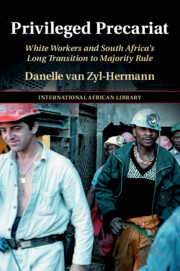Book contents
- Privileged Precariat
- The International African Library
- Privileged Precariat
- Copyright page
- Dedication
- Contents
- Table and figures
- Acknowledgements
- Abbreviations and acronyms
- Introduction
- Part I White workers and the racial state
- 1 Privileged race, precarious class
- 2 From sweetheart to Frankenstein
- 3 Race and rights at the rock face of change
- Part II White workers and civil society mobilisation
- Bibliography
- General titles
- Newspapers and online sources
- Index
- Series page
3 - Race and rights at the rock face of change
White organised labour and the Wiehahn reforms
from Part I - White workers and the racial state
Published online by Cambridge University Press: 17 April 2021
- Privileged Precariat
- The International African Library
- Privileged Precariat
- Copyright page
- Dedication
- Contents
- Table and figures
- Acknowledgements
- Abbreviations and acronyms
- Introduction
- Part I White workers and the racial state
- 1 Privileged race, precarious class
- 2 From sweetheart to Frankenstein
- 3 Race and rights at the rock face of change
- Part II White workers and civil society mobilisation
- Bibliography
- General titles
- Newspapers and online sources
- Index
- Series page
Summary
In 1977, the NP appointed the Wiehahn Commission to investigate the reform of the apartheid labour legislation. This chapter represents the first extensive utilisation of the Commission’s documentation for historical research, providing new insights into issues of race, labour, and citizenship in the late apartheid state. It shows that white organised labour was at the forefront of the investigation, with unions testifying before and workers’ representatives serving on the Commission. Exposing the limitations of existing race-focused scholarship which views white labour as homogeneous and reform as a ‘scheme’ to safeguard white supremacy, it shows that reform was not in the interest of lesser-skilled whites whose position relied on the rightlessness of black labour. Granting industrial citizenship to Africans undermined the established convergence between rights and race. While the redesign of labour relations had little impact on middle-class and elite whites, for white workers it marked the beginning of the long transition: more than a decade before the end of apartheid, labour reform amounted to the withdrawal of state support for working-class whiteness and initiated the dismantling of white workers’ racially privileged citizenship.
Keywords
- Type
- Chapter
- Information
- Privileged PrecariatWhite Workers and South Africa's Long Transition to Majority Rule, pp. 116 - 154Publisher: Cambridge University PressPrint publication year: 2021

